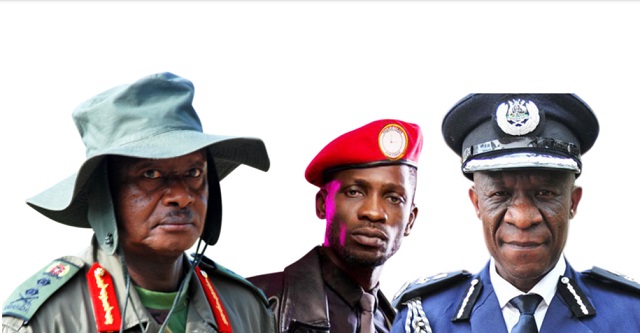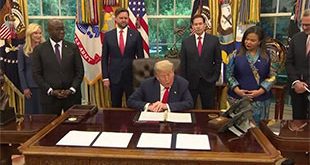
With Ochola, Sabiiti in charge, it also means more trouble
Kampala, Uganda | HAGGAI MATSIKO | On May 04 President Yoweri Museveni released a public statement detailing his views on the recent spate of violent run-ins between police and leaders of some opposition groups.
“If you want to hold a public meeting (olukungana) or a procession (ekivvulu) for a legitimate reason, you should liaise with police so that your procession does not endanger the lives of Ugandans or the safety of their property,” the President wrote.
He added: “Therefore, if you want to assemble publicly or hold a procession, it must be for a legitimate reason. If it is to preach hate, to decampaign investments in Uganda, etc., then we shall not allow you.”
Museveni’s statement is likely to be read over and over by many, but especially by Inspector General of Police (IGP) Martins Okoth Ochola and his deputy, Maj. Gen. Steven Sabiiti Magyenyi.
The duo will regard the statement as an order. They will assume they are expected to implement it. That, however, could become problematic because Museveni’s statement is open to many interpretations.
What is a legitimate reason for assembling? What does the President mean when he says “liaise” with the police? What is to “preach hate, to decampaign investment?”
The President’s statement comes about two weeks after the April 25 meeting between leaders of the government and opposition parties to discuss how the police force is implementing the Public Order Management Act (POMA) which was enacted in 2013 to guide on the issue of public assemblies.
It has since become a blanket shroud for police to break up rallies, make arrests, and cancel any meeting organised by any opposition party or individual. According to many observers and commentators, the situation is likely to get worse as the 2021 general elections campaign approach.
Tougher challenge for Museveni
Historically, such pressure has always intensified around police in the buildup, during and after elections.
Unlike in 2016 when Museveni only faced two strong candidates, he might face four tough challengers in 2021. Bobi Wine of People Power, Besigye of FDC, Gen. Mugisha Muntu of the new political party—Alliance for National Transformation (ANT), and Norbert Mao of the Democratic Party bloc.
Under normal circumstances, Ochola should have nothing to worry about; apart from just ensuring law and order. However, the ruling party is used to police being part of the machinery that frustrates the opponents and aids the process of keeping power, observers say.
Sometimes police’s contribution is indirect. In July 2010, for instance, police recruited 5,500 Special Police Constables (SPCs) to the force. Officially, these were supposed to assist in the policing of elections. However, observers said they threatened and intimidated people mostly at the expense of the opposition.
Then ahead of the 2016 elections, police recruited so-called Crime Preventers. These openly identified with Museveni and the NRM.
Now, ahead of the 2021 election, the police plans to recruit 10,000 Probationer Police Constables (PPCs) and 105,000 Special Police Constables (SPCs) according to the Budget Framework Paper FY 2019/20. Already about 6000 of these have completed a year-long training and have been deployed, mainly in the Kampala City area. But the opposition is likely to be tougher to handle.
Ochola’s biggest headache is likely to be Bobi Wine.
Ochola’s predecessor had learnt the ways of the main targets around election time, mainly then-FDC presidential candidate Kizza Besigye.
Kayihura had infiltrated the FDC with informers and could sometimes foil their plans long before they acted on them. That the Besigye of 2016 and before operated within the well-known structures of an organization—the FDC, helped Kayihura a lot.
With the departure of Kayihura, observers say, police appear to have lost the ability to penetrate the opposition, know what they are planning beforehand and demobilise them.
Bobi Wine on the other hand is also completely new on the political scene. The Kyadondo East MP also does not operate within any known structures.
Yet he has shown that he is able to mobilise support locally and abroad to the extent of replacing Besigye as Museveni’s biggest challenger ahead of the 2021.
A new poll by Research World International (RWI) shows that if elections were held around now, Museveni would get 32 % of the vote, Bobi 22 % and Besigye 14 %.
Another sign of Bobi’s ever growing strength is that candidates in any election who identify with his `People Power’ slogan, win. They are mostly young and have swept student guild elections at most major universities. The biggest percentage of voters in the 2021 elections will be in the same bracket—between 18 and 40 years.
Since October 2017 when Bobi Wine emerged as a serious contender against President Museveni, police has blocked 124 of his events, including music concerts.
On April 22, police blocked Bobi Wine, smashed his car window and sprayed him with pepper spray, before arresting him and others who were accompanying him. The attack was similar to another infamous one in 2011 against opposition politician Kizza Besigye in Kampala in 2011. The police subsequently held Bobi Wine under house arrest.
 The Independent Uganda: You get the Truth we Pay the Price
The Independent Uganda: You get the Truth we Pay the Price



